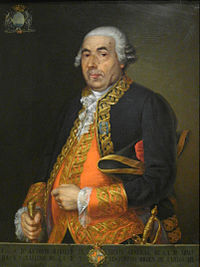Antoni Barceló
Antoni Barceló i Pont de la Terra ( Spanish also Antonio Barceló ; born October 1, 1717 in Galilea , † January 30, 1797 in Palma ) was a Mallorcan navigator and corsair in the service of the Spanish crown.
Life
Dom Barcelo was born on October 1st, 1717 in the Mallorcan village of Galilea. Initially a cabin boy, at the age of 18 he took over the Schebeke from his late father , with which he carried mail between Palma de Mallorca and Barcelona . At the age of 19, Barceló was the first victim of a pirate attack , but he was able to drive them away. Because he repeatedly fought successfully against pirates, he was made an honorary lieutenant of the frigate by King Philip V at the age of 21 . No commoner had ever received this title before.
At the age of 24, the postman received an unusual order from the Balearic fleet commander José Vallejo: Barceló was to pursue a French cutter on which the dragoons Manuel Bustillo had fled together with the nun Margarita de Valseda. Barceló brought up the cutter and Bustillo was beheaded on the Paseo del Borne in Palma . Valseda spent the remaining 40 years in the monastery. For his services, King Barceló granted the corsair patent ( patente de corso ), the license to hijack enemy ships in the name of the crown.
1750 had Barceló on behalf of the King of Spain Schebeke Santo Cristo del Crucifijo come to the rescue in Cala Figuera by a Moorish Galeote was threatened. Barceló chased the galeote from Cap Formentor to Cabrera , where he was able to sink it. In 1761, the king promoted Barceló to frigate captain and granted him state pay. In the next eight years, Barcelóna sank 19 enemy ships, made 1,600 prisoners and freed more than a thousand Christian slaves from the captivity of Moorish pirates. In 1770 he put the feared pirate Selim in chains.
During the blockade of the British-occupied Gibraltar in 1779, Barceló came up with the idea of equipping small rowing boats with cannons. In Spain he is considered to be the inventor of the early gunboats . By the time Barceló was raised to the rank of lieutenant general at the age of 66, he was already deaf from the thunder of cannons.
As a fleet commander, Barceló led punitive expeditions against the Corsair Republic of Algiers . In 1793 he succeeded in destroying ten percent of the city and thereby remaining largely without losses. In another attack on Algiers, Barceló fell from his boat into the sea, but was saved. The North Africans suffered so much losses that Algeria and Tunisia entered into peace negotiations with Spain. The end of piracy in the Mediterranean was heralded.
Antoni Barceló died in his home in Caimari in 1797 and is now buried in the sailors' church of Santa Creu in Palma . A statue of Barceló in the city's harbor, near the ferry terminal, is a reminder of the seafarer.
Others
In Spain a nursery rhyme is known about Barceló: “Si el Rey de España tuviera, cuatro como Barceló, Gibraltar sería de España, que de los Ingleses no.” - Translation: "Had the King of Spain, four like a Barceló, Gibraltar belonged to Spain, and not to the English."
literature
- Cervera y Jácome, Juan: El Panteón de Marinos Ilustres . Madrid: Ministerio de Defensa, 1926.
- Hampp, Bernhard: The cannons of Captain Toni. In: Mallorca Zeitung No. 4th year, 2004, ISSN 1576-4362 , p. 35.
- Lacosta, Xavier: El caso balear. In: Historia 16, No. 320, 26th vol., 2002, pp. 35-43.
Web links
Individual evidence
- ↑ Bernhard Hampp: The cannons of Captain Toni. In: Mallorca Zeitung No. 4th year, 2004, ISSN 1576-4362 , p. 35.
| personal data | |
|---|---|
| SURNAME | Barceló, Antoni |
| ALTERNATIVE NAMES | Barceló, Antonio |
| BRIEF DESCRIPTION | Spanish navigator |
| DATE OF BIRTH | October 1, 1717 |
| PLACE OF BIRTH | Galilea |
| DATE OF DEATH | January 30, 1797 |
| Place of death | Palma |
